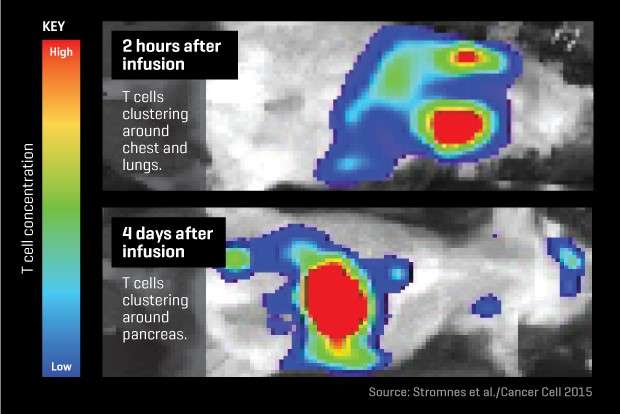A form of immunotherapy shows promise against pancreatic cancer in a mouse model. The scientists engineered T cells to recognize pancreatic cancer cells -- the cells homed to mice's tumors within a few days of infusion. Credit: Stromnes et al./ Cancer Cell 2015
Dr. Sunil Hingorani, a member of the Clinical Research and Public Health Sciences divisions at Fred Hutchinson Cancer Research Center, will present recent groundbreaking developments in treating pancreas cancer with engineered T-cells at the American Association for Cancer Research Annual Meeting 2016 in New Orleans on April 16.
Hingorani, a pancreatic cancer specialist, teamed up with Fred Hutch immunotherapy experts Drs. Phil Greenberg and Ingunn Stromnes in successful efforts to breach the cancer's physical and immunological walls using immunotherapy, a type of treatment that harnesses or refines the body's own immune system with T-cells engineered to recognize and destroy cancer cells.
Specifically, Hingorani's team created T cells with a high affinity to a "relatively" tumor-specific antigen. Why relatively? Notoriously difficult pancreatic tumor cells don't produce many unique proteins that allow for completely tumor-specific T cells. Instead, the team had to look for proteins that are expressed in unusually large amounts in the tumor cells and minimally expressed elsewhere. The T cells then were engineered to attack those.
But there was a potential problem: That same targeted mesothelial protein also can be found in the linings of the heart and lungs. However, in tests on mice with pancreatic tumors and immune system responses nearly identical to those in humans, the engineered infused T cells parked only briefly in those linings (without harming them) and then moved along to attack the tumor cells. What's more, they killed those cells over a 10-day period, as did subsequent infusions.
Additionally, Hingorani and his team have worked to develop an enzyme that can help defeat the tumor's high interstitial pressures and potentially open the door for greater penetration and effectiveness of T cells and other types of agents. By the end of the year, Hingorani hopes to have the human version of the T cell in clinical trials.
Provided by Fred Hutchinson Cancer Research Center






















